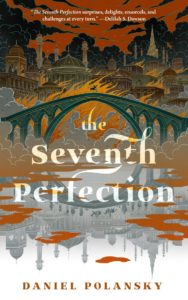
The Seventh Perfection is a novella that I didn’t hear much about when it came out last year, but over the past few months, I started seeing reviews trickling in. Some of them were glowing. Some of them were mixed. But they were all intriguing. I wasn’t sure whether I’d love the book, but it promised an experimental structure that I wanted to see for myself. And so I requested my library order it (note: this is a very cool thing you can do in many places and I recommend it), they did, and I got to try it out last month.
The Seventh Perfection stars Manet, a servant of a God-Emperor, one who has studied the titular seven perfections and has, among other things, a perfect memory. But she is beginning to suspect that the story behind the last generation’s revolution is in some key aspects inaccurate, and she takes it upon herself to solve the mystery. The novella follows her for three days and consists entirely of half-dialogues—every chapter is a different conversation and includes the words spoken to Manet, but the words Manet speaks herself are entirely omitted. This isolates the reader entirely from Manet’s internal monologue, preventing us from seeing her suspicions and keeping us in the dark until the pieces truly begin to fall into place.
Having recently read and enjoyed several short stories with experimental formats, it was the format that caught my eye here, one that forces the reader to search for contextual clues as to the main character’s perspective, rather than being told straight out. And, while I’m not sure the story totally demands such a format, it’s an effective way to prevent the reader from getting too good a glimpse at what the lead suspects, much the same as Sherlock Holmes hides his suspicions by simply not telling Watson the details until they’re confirmed.
What surprised me, however, was the power of the emotional development in a story where we never really see the main character’s perspective. This is an epic tale, and Manet learns it at great cost to herself. And the reader truly feels that cost, internal monologue or not. It reminds me in many ways of another 2020 novella—my pick for the Hugo Award for Best Novella, in fact—The Empress of Salt and Fortune, in which an obliquely-told epic starts with decontextualized pieces but grows into a story no less powerful for the unusual and disjointed telling.
Unlike Empress, however, I didn’t feel like the pieces fell perfectly into place for The Seventh Perfection, which was much more comfortable to sit in ambiguity and mysticism. It put the lead through the wringer, and it had plenty to say about power structures and the stories they tell about themselves, and those made it entirely worth the read. But after so much buildup, the last few chapters felt mystical and dreamlike and sped by in a blur. For some readers, that may feel like the perfect ending. But for me, while the ending still offered the closure I wanted, it just didn’t have quite the power of the lead-up. I love the ambition and so much of the story itself, and I wish we’d seen The Seventh Perfection take the place of some fairly average novellas on the Hugo Finalist list. But ultimately, while I enjoyed the novella and would recommend it, the ending held it back from true greatness.
Recommended if you like: experimental formats, oblique epics, examinations of power and propaganda, mysticism.
Can I use it for Bingo? I don’t recall any other obvious options, but it is without a doubt a hard mode Mystery Plot.
Overall rating: 15 of Tar Vol’s 20. Four stars on Goodreads.
